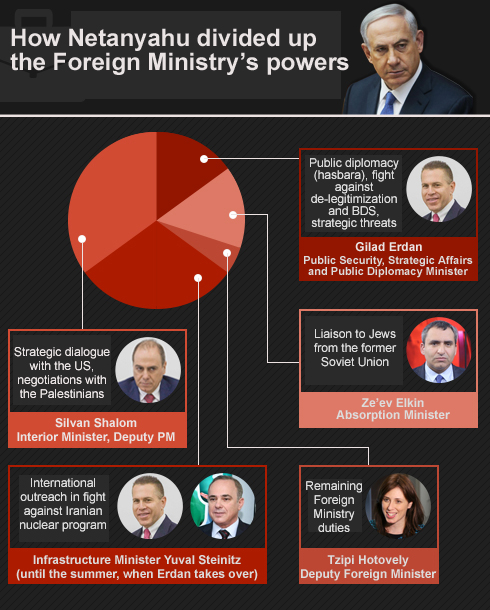
With Foreign Ministry stripped of powers, diplomats fear for Israel's standing
Veterans and officials warn of 'death blow' to the ministry that leaves Israel weakened on international stage, while foreign diplomats say they don't know who they are supposed to talk to.
There is growing alarm within the Foreign Ministry and its veterans, as well as among members of the foreign diplomatic corps, over the decision by Prime Minister Benjamin Netanyahu to the divvy up the ministry's roles among various ministers from the Likud, leaving the ministry itself impotent and unable to function.
On the ground, the public diplomacy department at the Prime Minister's Office has instructed the Foreign Ministry to coordinate in advance all official announcements, which present the official position of Israel on a series of issues. The Foreign Ministry has even been deprived of the right to issue responses on behalf of the State, unless approved by Prime Minister Benjamin Netanyahu, who also holds the post of foreign minister.
On the practical level, the Foreign Ministry fears that after this "dismemberment" of the ministry's powers a range of issues - war, boycotts, public diplomacy, strategic issues and so on – it will be left with a depleted budget and no real ability to function.
"The Foreign Ministry has been talking about an organizational crisis for a while. The blow the ministry has now been dealt is a death blow. Whoever tore apart this ministry out of political considerations is causing damage to the country," a Foreign Ministry official said.
Veteran ministry employees said that Netanyahu is accustomed to bypassing Israeli ambassadors in meetings with heads of state and foreign ministers.
"He does not trust the ambassadors," says one. "Whenever he visits Jordan, for example, our ambassador is not even invited to the palace. Netanyahu thinks the ambassadors of Israel do not really represent Israel, but the foreign countries (in which they are based). The ministry is paralyzed, unable to act."
Amos Nadai, former Israeli ambassador to China and a now retired senior Foreign Ministry official, wrote on his Facebook page: "The foreign minister is entitled to replace the director-general. The problem is not the dismissal of the ministry DG, but rather the targeted assassination that the prime minister is carrying out at the Foreign Ministry, by which he is (again) harming an essential interest of the state.
"It is needless to explain, even to those who are not Foreign Ministry staff, why Israel needs a serious, powerful and effective Ministry of Foreign Affairs. At a conference of ambassadors several years ago, Bibi said that the ministry is an important part of the defense mechanisms of the state. And here he is completing the process of stripping the ministry of its powers and breaking up its assets, causing irreparable damage to Israel's foreign relations."
- Shalom claims he's de facto foreign minister
- Netanyahu embarks on senior civil service 'beheadings'
- Sima Kadmon / Netanyahu's ministers and their hollow titles
Even foreign ambassadors stationed in Israel are having difficulty understanding what is left of the Foreign Ministry.
"There is a lot of confusion over who we are supposed to work with in this government. There are too many players and too many sensitivities," said one European ambassador.
"We understand that until the summer we will be discussing Iran with Yuval Steinitz but after the summer with Gilad Erdan. The Palestinians are talking to Silvan (Shalom). So what do we talk to (Tzipi) Hotovely about? Africa?"
Another ambassador of a Western country repeated Henry Kissinger's old remark that Israel's working assumption is always that there is no foreign policy, only domestic policy. "It will take us a long time to figure out who our contacts are in this government. It's a hard challenge."
Meanwhile, the Foreign Ministry wokers' committee has formally responded to the dispersal of the ministry's authorities.
"The division of responsibilities for managing foreign relations between several ministries, which have recently been reported in the media, could create an impossible situation in terms of Israel's ability to cope with diplomatic challenges.
"We are confident that the entire process will be accompanied by the allocation of the resources and tools required for proper and professional dealings by the Foreign Ministry in this area."
The committee added: "We hope that the distribution of powers will not harm the ongoing work of the Foreign Ministry and the State of Israel will invest all necessary resources in the recruitment of quality personnel. Foreign Ministry officials are dedicated employees who devote their entire careers to the image of Israel around the world. These ministry employees welcome every new appointment at the Foreign Ministry, and hope this collaboration will strengthen its activities."
Deputy Foreign Minister Tzipi Hotovely refuses to get excited about the statements on the dismantling of Foreign Ministry powers: "There is nothing new here. What was will be," she said. "The ministry's powers were dispersed during Lieberman's time as foreign minister.
"This is how the crisis between the Prime Minister's Office and the Foreign Ministry began, and the prime minister did everything he could to weaken Lieberman. During Lieberman's time as well, (Tzipi) Livni handled the negotiations with the Palestinians and Steinitz the war on the boycott and strategic threats. This is not taking more powers from the Foreign Ministry."
Prime Minister's Office maintained Wednesday that there is full cooperation and close coordination between the ministries.











